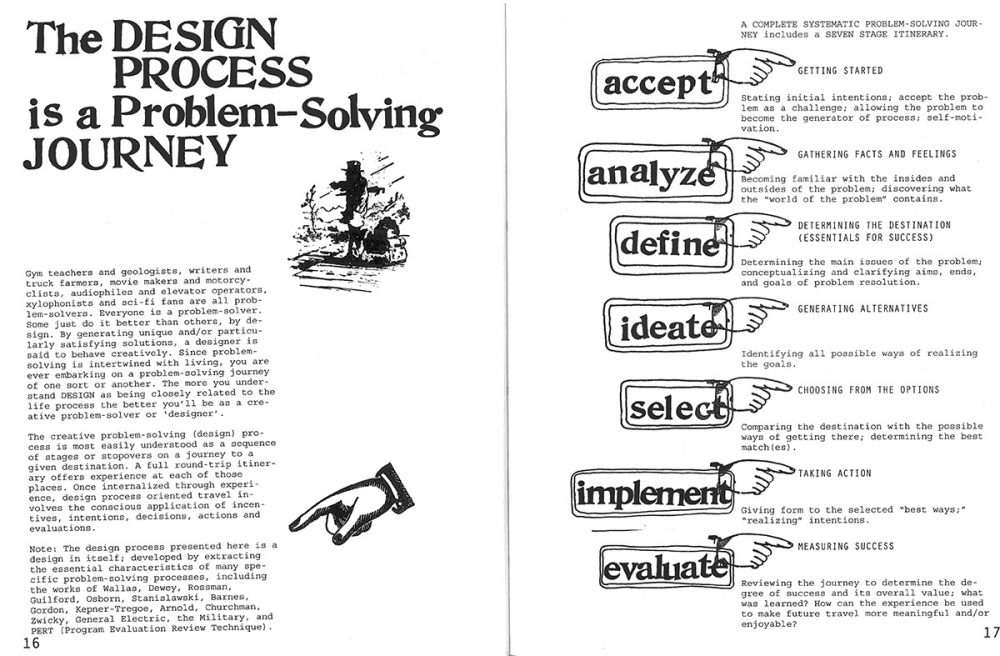An overview of the design process (sometimes called "design thinking").

Designing isn’t magic. It’s a process. If you know the process, you can design. The better you are at the things Hillman Curtis mentioned in his quote, the better designer you will be. The process, however, is the same for just about any design practice. Let’s look closely at the design process.
Tony Fadell, a Product Designer who worked at Apple and Nest, talks about where to start when designing.
There are many different design thinking processes out there. I have found these five to be helpful when designing any project.
- 5-Step Design Thinking Process: This process is very common in design and is discussed in-detail at Interaction Design Foundation.
- IDEO Design Thinking: IDEO is a leader in design thinking. Their process is shared on their What is Design Thinking? webpage.
- The All-New Universal Traveler: A Soft-Systems Guide To Creativity, Problem-Solving, And The Process Of Reaching Goals was a very early book on the design process.
- The Design Sprint was created by Jake Knapp at Google Ventures. Learn more about the process at the Sprint book website.
The Design Thinking Process in One Place
The chart below brings all of their steps into one tidy presentation. Note how many steps are the same across design thinking processes.
| 5-Step Design Thinking Process | IDEO Design Thinking Process | The Universal Traveler | Design Sprint (Google) | |
|---|---|---|---|---|
| Pre-Work | Set the Stage Prepare a space and tools needed to operate a sprint. Get your mind ready to think like a designer. | |||
| Launch the Project | Frame a Question Identify a driving question that inspires others to search for creative solutions. | Accept Set your initial intentions; accept the problem as a challenge; allow the problem to become the generator of the process. | ||
| Research | Empathize Gain an empathic understanding of the problem you are trying to solve. | Gather Inspiration Inspire new thinking by discovering what people really need. | Analyze Gather Facts and Feelings: Become familiar with the insides and the outsides of the problem; discover what the “world of the problem” contains. | Map “Boot up” as much information as quickly as possible. Gather information from all team members. |
| Specify the Need | Define Put together the information created and gathered. Create a clear “problem statement.” | Define Determine the destination. Define the main issues of the problem; conceptualize and clarify aims, ends, and goals of problem resolution. | ||
| Produce Solution Ideas | Ideate Identify new solutions to the problem statement you’ve created, look for alternative ways of viewing the problem. Generate many ideas. | Generate Ideas Push past obvious solutions to get to breakthrough ideas. | Ideate Generate alternatives. Identify all possible ways of realizing the goals. | Sketch Solve the problem by using a method optimized for deep thinking. Every individual sketches their own detailed, opinionated solutions. Make a storyboard to show how the design will work. |
| Choose a Direction | Select Choose from the options. Compare the destination (goal) with the possible ways of getting there; determine the best match(es). | Decide Determine which of your sketches should be prototyped and tested. | ||
| Create the Design | Prototype Build rough prototypes to learn how to make ideas better. | Make Ideas Tangible Build rough prototypes to learn how to make ideas better. | Implement Take action. Give form to the selected “best ways;” realize intentions. | Prototype Build a realistic prototype of the solution(s) you selected. |
| Test the Design | Test Rigorously test the completed product using the best solutions identified during the prototyping phase. Learn if any adjustments need to be made. | Test to Learn Refine ideas by gathering feedback and experimenting forward. | Evaluate Measure success. Review the design’s impacts to determine the degree of success and its overall value; what was learned? | Test Present the solution to stakeholders and quick-and-dirty answers to your most pressing questions. |
| Share with Others | Share the Story Craft a human story to inspire others toward action. |
The design process can be applied to just about any problem. It all comes down to being aware of the need and working to create and test solutions till you find the right fit.

Want to see Design Thinking in action? Check out the Creative Confidence Series Webcast Episode about how IDEO uses design thinking to address different business challenges. The video is at the bottom of the page. Each chapter is excellent.
References
Knapp, J., Zeratsky, & Kowitz, B. (2016). Sprint: How to Solve Big Problems and Test New Ideas in Just Five Days. Simon & Schuster.
Koberg, D., & Bagnall, J. (1976). The All New Universal Traveler: A Soft-Systems Guide To Creativity, Problem-Solving, And The Process Of Reaching Goals. W. Kaufmann.